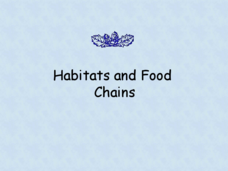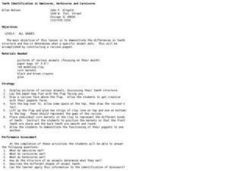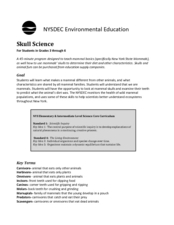Curated OER
Animal Skulls
Pictures of different animal skulls make this slide show fascinating. The intent is to display the differences in structure among herbivores, carnivores, and omnivores. If you do not have animal skull replicas, this presentation would be...
Scholasic
The Magic School Bus and the Missing Tooth
We chew with our teeth every day, but how much do we really know about them? Allow Ms. Frizzle to teach your kids a thing or two about teeth. Kids complete a prereading exercise, read the book, and respond to several prompts about the...
American Museum of Natural History
Super Teeth
A brief comparison of human teeth versus animal teeth sets the stage for two worksheets. Scholars match a picture of a tooth-filled mouth to the animal to which it belongs and coloring pages featuring a different animal and informative...
Curated OER
Skulls Tell It All
Skulls tell it all, and with this lesson plan, you will tell it all to your class! Youngsters view animal skulls, analyzing the shape of teeth and the placement of the eye sockets. They associate these adaptations with the types of food...
Curated OER
Teeth and Eating
Students conduct online research of different animals and their diet. In this animal activity, students identify the various types of diets each animals has and their teeth. This research is done on the Internet.
Curated OER
Who Wants to be a Millionaire: Teeth
What kind of teeth do alligators have? Find out as you play a quiz game all about teeth. There are 15 questions all related to how various animals eat, swallow, and chew with their chompers.
Curated OER
Teeth and Eating
Students examine pictures of different animals and decide if they eat meat and/or plants. They inspect models of pairs of upper and lower teeth and discuss which teeth are most useful for cutting grass and tearing meat.
Curated OER
Animal Nutrition, Variations, Adaptations & Regulation
Information about digestion of various food components is given in this PowerPoint. The diets of herbivores and carnivores are compared, and there are many diagrams giving details of their digestive system specializations. The...
Curated OER
A Tooth for a Tooth
Learners classify mammals as carnivores or herbivores. They look at a set of pictures of animal skulls, observing the shape and size of the teeth, and identify herbivores and carnivores.
Curated OER
Module 2: "Keeping Teeth Bright and Healthy"
Students become aware why cleaning their teeth helps keep them strong and healthy. They study basic brushing techniques, what plaque is, how a cavity is formed, why having clean teeth is an important part of having a clean body and why...
Curated OER
Be Kind to Your Teeth
What kinds of food can be bad for your teeth? Kindergartners and first graders explore dental health with an interactive science inquiry. Given a choice of foods such as celery, cake, and milk, kids choose which ones are better for their...
Curated OER
What Teeth Tell Us
Students view pictures of a variety of animals. They examine the animals' teeth and discuss the differences in them. They experiment with staple removers (carnivore teeth) and two flat rocks (herbivore teeth) and determine which are most...
Curated OER
Habitats and Food Chains
Uncover the world of animal habitats, food chains, and the ecosystems with this well-put-together presentation. Each slide contains information and images that represent various aspects related to the ecosystem. Habitat, animal...
Curated OER
Teeth and Eating
Students explore animal diets and teeth. In this animal science lesson, students view photos of animals and their teeth. Students identify the type of diet the animal has based on the teeth. Students are introduced to the terms...
ProCon
Vegetarianism
What do Mike Tyson, Ellen DeGeneres, and Paul McCartney have in common? They're all famous vegetarians. Using the resource, scholars learn about the pros and cons of eating a vegetarian diet. They read a fascinating history of...
Curated OER
Who Eats Who?
Students recognize that some animals eat plants, some eat meat and some both. In this who eats who lesson, students chart animals in a food chain. Students research information from reading articles. Students chart what...
Curated OER
Teeth Identification in Omnivores, Herbivores and Carnivores
Students practice identifying teeth. In this biology lesson plan, students explore the differences in teeth structure and how it determines what a specific animal eats by constructing a raccoon puppet.
Curated OER
Eukaryotic Animal Cell, Candy Cell Model: Science
Students review the parts of the eukaryotic animal cell and construct a model using various types of candy.
Curated OER
Ocean Exploration
Young scholars explore whales. In this animal adaptation and whale lesson, students access prior knowledge about whales from previous lessons, then use background knowledge to predict the eating strategies of a baleen whale and a toothed...
Curated OER
Tooth Detectives: Determining the Diets of Extinct Animals
Students study the teeth of living mammals and apply those skills to the interpretation of the diet of extinct animals.
Curated OER
Amazing Animal Facts
For this unique animal association worksheet, students match up ten animal facts with ten pictures of various animals shown on the worksheet.
Curated OER
Dinosaur Paleoecology: Determining the Diet of Ancient Animals
Students study dinosaur teeth and bones to determine the creatures diet, size and shape.
Curated OER
Skull Science
What can your class learn from a skull? With proper facilitation, they can learn about diet, physical adaptations, special differences, and even the environment. Pupils will examine a series of mammal skulls and pelts to help them...
Curated OER
Dinnertime for Animals
Is a deer an herbivore? What about a spider? Experiment with the food chain in an interactive science experiment. After listing the herbivores from a selection of animals, third and fourth graders compare the skulls and teeth of...

























